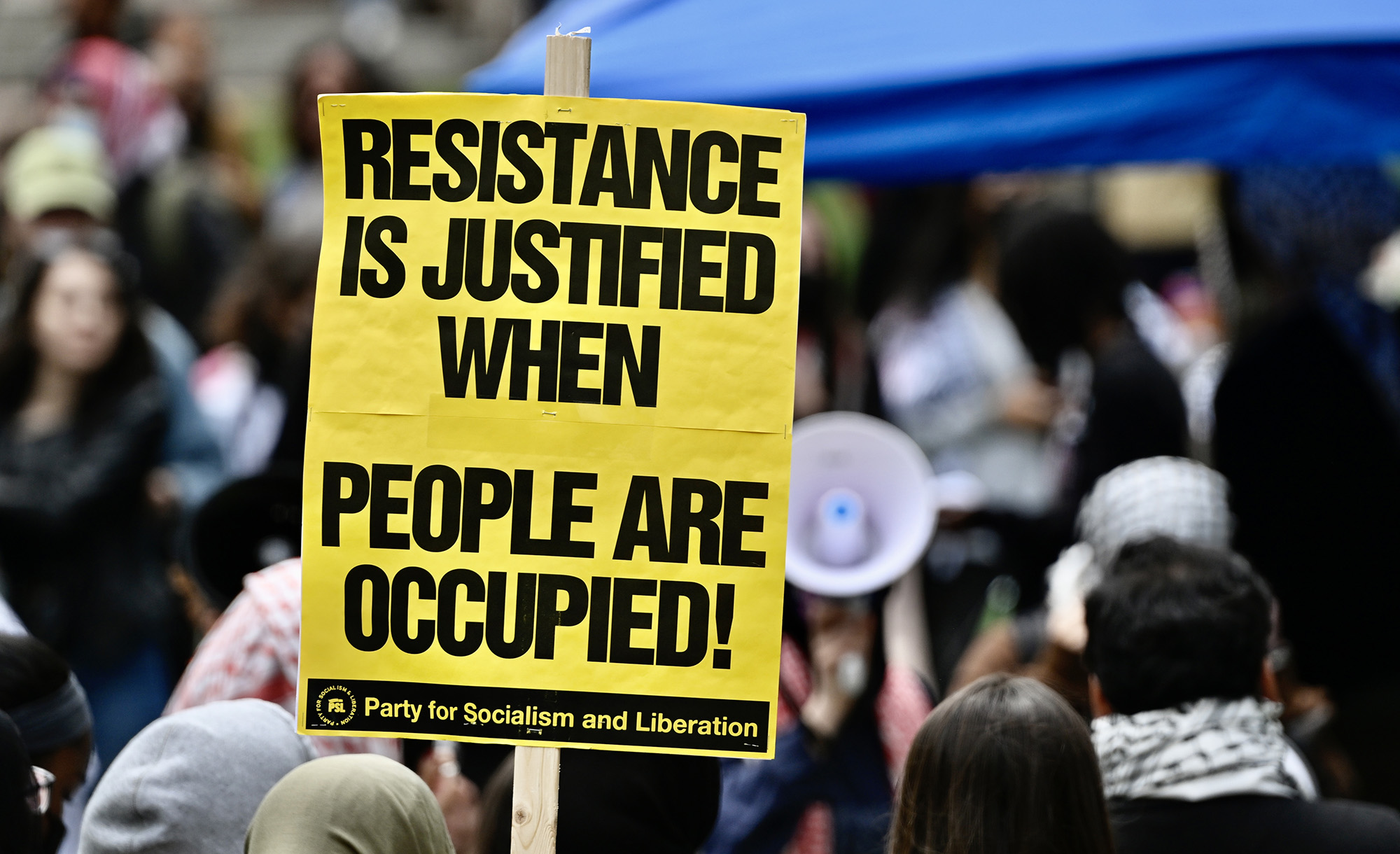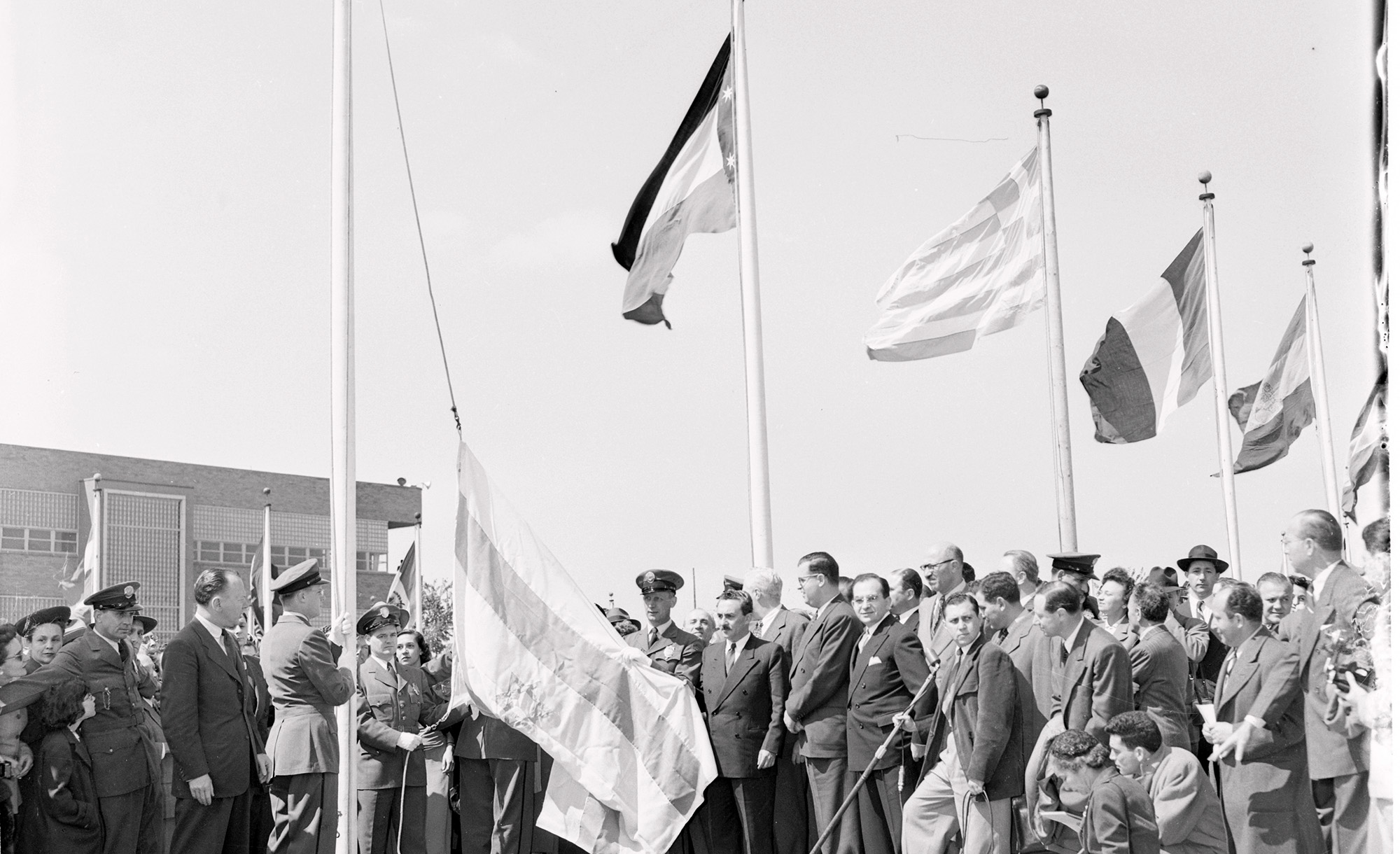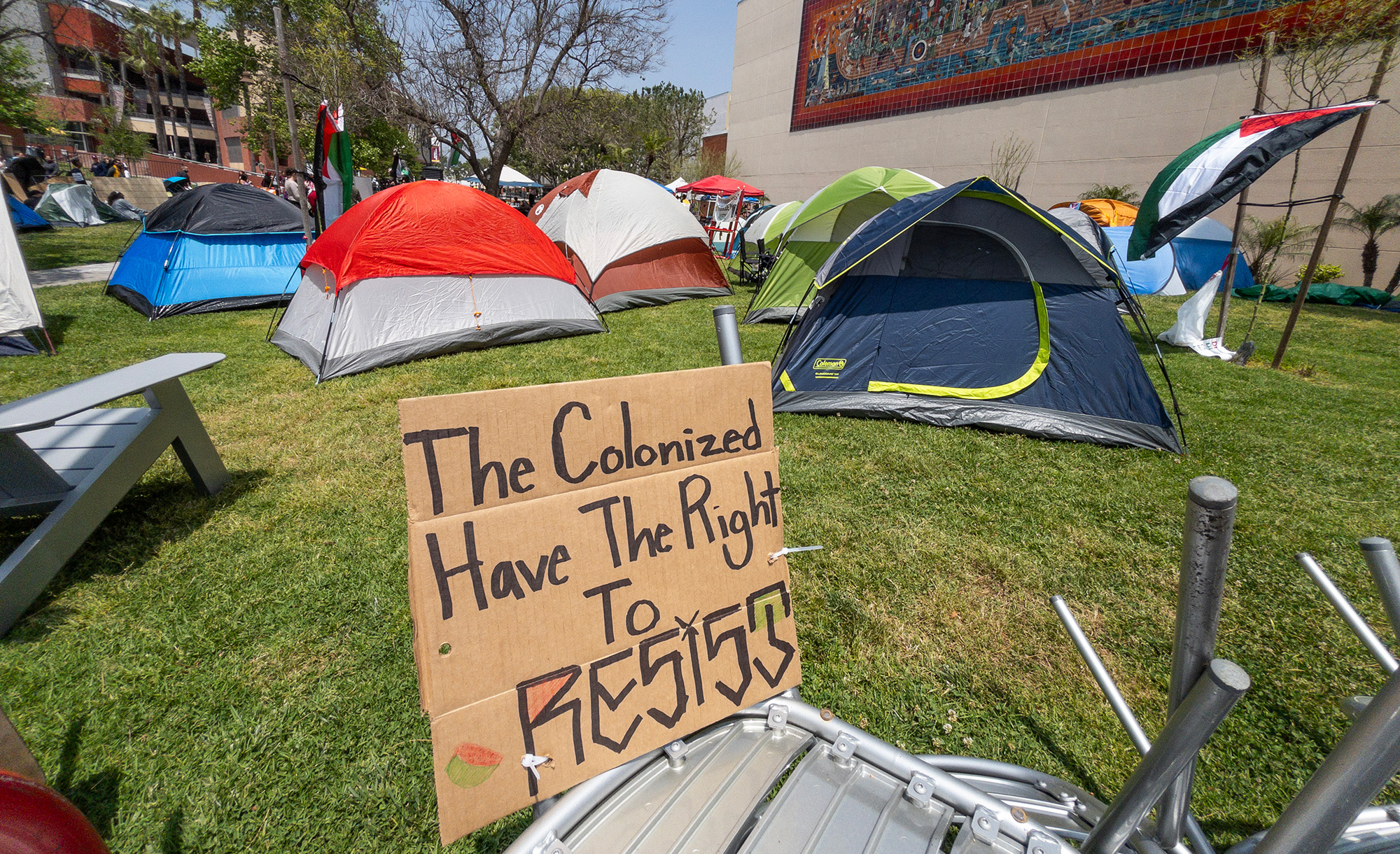The anti-Israel demonstrations on American campuses have been compared to the anti-Vietnam War demonstrations of the 1960s and early 1970s. In their intensity, they may be similar. In their stupidity, they are not. Nowhere is the difference between the two protest movements more immediately apparent than in the quality and nature of the slogans used by their participants.
When one considers the slogans of the anti-Vietnam War movement, one is struck by the wit and humor of many of them. Many still have the power to make one smile or laugh, such as the “Make Love, Not War” motto that probably outdid any other in its popularity. What made it so potent, yet so funny? Partly, its clever yoking together of two opposed English idioms that shared only the verb “make”; partly, its puckish suggestion that everyone, from the foot soldier in Vietnam to the president of the United States, would be better off in bed with someone else than on a battlefield or in a war-cabinet session; partly its invoking of the sexual revolution of the sixties as both the antithesis of, and the alternative to, a supposed culture of aggressive militarism; and most sweepingly, its implication that life-giving Eros and death-dealing Thanatos are different expressions of the same human libido, and that the first is preferable to the second. That’s a lot to pack into four words, but “Make Love, Not War” managed to do it.
Other anti-Vietnam War slogans were almost as memorable. Some, like “Hell, no, we won’t go [to fight in Vietnam]” were chanted at demonstrations. Two favorites that I remember were displayed on signs. One bore the iconic flower of hippiedom and the words, in a take-off of the warning recently introduced in those days on packs of cigarettes, “War Is not healthy for children and other living things.” The other, a parody of the famous World War I recruiting billboard, had a drawing of a grim-faced Uncle Sam exhorting, “Join the U.S. Army! Travel to exotic lands, meet exciting people, and kill them.” There was the stern “If you support this war, send your own children,” and the poignant “Not our sons, not your sons, not their sons.” A sign carried only by black demonstrators said, “No Vietnamese ever called me n—r.”
There were, of course, angrier and more violent anti-Vietnam War slogans, too, such as the chant “Hey, hey, LBJ, how many kids did you kill today?” But these, though they spread as the war dragged on and public frustration with it mounted, were never the rule. The dominant tone was irony and sarcasm, the underlying message: “You who are prosecuting this war may be more powerful than we are, but we are smarter than you, more creative than you, and more caring for human life and human beings, and because of this, we will prevail.”
Compare this with:
- “Red, black, green, and white, we support Hamas’s fight!.”
- “Hitler, Hitler, go back home! Palestine is ours alone!”
- “Globalize the intifada!”
- “One, two, three, four, Israel will be no more! Five, six, seven, eight, Israel we’ll eliminate!”
- “There is only one solution! Intifada revolution!”
- “Say it loud, say it clear: we do not want Zionists here!”
- “Oh, al-Qassam, you make us proud! Kill another soldier now!”
- “Resistance by any means necessary!”
- “Palestine is our demand! No peace on stolen land!”
- “We say justice. You say how? Burn Tel Aviv to the ground!”
- “We don’t want no two states. We want all of ’48!”
The sheer idiocy of such slogans is as staggering as is their hatefulness. Those who compose them seem to be under the impression that whatever rhymes is intelligent, and their ability to put two rhyming words together in what resembles a cheer for a high-school basketball team appears to be as far as their intelligence extends.
One mustn’t, of course, overgeneralize. Although many college students have joined the demonstrations, many times their number haven’t. Still, changed attitudes toward Israel aside, something has clearly happened to the minds of young American protesters between the 1960s and today. What?
Well, childhoods and adolescences dumbed down by smartphones, WhatApp, and Facebook, for one thing. And college educations given by teachers, products of the postmodernism and deconstructionism that gained ascendancy on university campuses in the last decades of the 20th century, who have taught that there is no such thing as verifiable truth or falsehood but only the competing narratives of oppressed and oppressor, and that it is incumbent to identify with the latter. And a national politics that has become one of non-debatable identities rather than of debatable issues. And the fear of saying or thinking anything that smacks of racism, sexism, genderism, religionism, elitism, nationalism, patriotism, colonialism, ethnocentrism, Orientalism, or whatever else might offend progressive values and the feelings of others, with the notable exception of those whose feelings it is permissible to offend.
None of this has been conducive to independence or subtlety of thought, let alone to irony or humor; combine it with a growing antagonism toward Israel and its Jewish supporters, now squarely placed by many young Americans in the camp of the oppressor, and you get the imbecility of “Go, Hamas, we love you! We support your rockets, too!” But whence all that rage, whence all that hate?
This is a question worth pondering. After all, the student demonstrators of the 1960s had much better reason to be consumed by such emotions (and some were) than those today. The government they were protesting against was sending them to fight, and possibly to die, in a war they considered immoral and unjust. What comparable threat does Israel, however immoral or unjust it may strike them as being, pose to students on American campuses now? What is all the screaming at it about?
The stock answer given by Israel’s supporters is: anti-Semitism. It’s hard to argue with that. When a Jewish state is vilified by mobs of students for supposed atrocities the likes of which leave them indifferent when committed by other nations, an antipathy toward Jews clearly has something to do with it.
But rampant anti-Semitism, as we know, does not spring from nowhere. It’s always an expression of some deep fear or resentment that the anti-Semite projects onto the Jew. What are today’s student demonstrators projecting that students in the 1960s were not?
Possibly, the loss of hope.
The demonstrators of the 60s were, like all rebellious young people since at least the time of the American and French Revolutions, a hopeful lot. They believed, however naively, in their power to make a better world than the one they were born into. They may have been the last generation in human history to do so. They were certainly the last in a chain going back two centuries or more, since what young person today honestly thinks life might get better in his lifetime? At most, it might be kept from not getting too much worse: too much hotter, too much more spun out of control by blind, unstoppable forces, too much more stripped of its human face by technology and artificial intelligence. The young generation’s task as the world passes into its hands will be to fight a holding action to stave off disaster, not to try creating something freer, more loving, and more joyous. If it doesn’t already know this, it surely feels it in its bones.
I would be full of anger, too, if such a world were passed on to me. Projecting such anger on a traditionally American-backed Israel that has almost nothing to do with the overall state of things is a tempting way to vent it. The more intelligent of today’s demonstrators will one day look back with embarrassment at the slogans they shouted. They will understand that they were shouting about something else.
More about: Gaza War 2023, Hamas, Israel & Zionism, Politics & Current Affairs, Student protests







